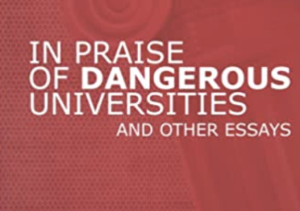Mark Mercer is a professor of philosophy at Saint Mary’s University in Halifax, who has served as president of the Society for Academic Freedom and Scholarship since 2015.
SAFS is a Canadian organization whose members are devoted to “academic rigour, scholarly inquiry, open discourse and free universities.” Academics like these appear to be in short supply on present-day college campuses.
Over the past several years, Mercer and other SAFS members have witnessed an intensifying challenge to the principles of freedom of speech and academic freedom.
Woke Administrators Condone ‘Proxy Reprisals’
Today, the vision of a safe campus is no longer a bucolic learning place where students and faculty can think, study, and speak freely while feeling relatively secure in their persons and property. The modern “safe university” has essentially become an intellectual sanctuary for the lunatic left.
More than a decade ago, Mercer pointed out that: “Canadians came to understand what it means to be part of a safe university when the controversial American media pundit Ann Coulter felt obligated to decline an invitation to speak at the University of Ottawa. Coulter cancelled her engagement on the advice of her security chief who judged that those demanding safety (in the new sense) were actually threatening people’s safety (in the old sense).”
Writing in the September 2022 edition of the SAFS Newsletter, Sinclair McRae, associate professor in the Department of Humanities at Mount Royal University in Calgary, pointed out that the free academy is not only under threat, but as in Lucille Fletcher’s classic radio drama “Sorry, Wrong Number,” the menacing calls are coming from inside the house.
McRae argued that academic freedom is under indirect threat from university administrators who condone “proxy reprisals” by woke professors who seek to silence dissident colleagues. “The professors in question,” McRae writes, “advocate oversight under the guise of protecting academic freedom from the dangers of free speech.”
Mercer has described administrators at Canadian universities as “cowards” and “careerists” who have “no idea what a university is for.” To quote University of Toronto professor emeritus Jordan Peterson from his book “Twelve Rules for Life”: “If you think tough men are dangerous, wait until you see what weak men are capable of.”
A Call for Scholarship Over Activism
Mark Mercer’s new book, “In Praise of Dangerous Universities” published by the Frontier Centre for Public Policy, is primarily a collection of essays in defence of what he refers to as “academic freedom and other hopeless causes.”
In his tongue-in-cheek reference to “hopeless causes,” Mercer is not recommending a pre-emptive surrender to orthodox woke culture. His book is a forthright wake-up call for freedom-loving teachers and scholars throughout the country.
“In Praise of Dangerous Universities” calls for a return to the rules of open discourse in which students can seek a fuller understanding of their world through critical inquiry and the free exchange of ideas.
Mercer stands firmly against teaching political activism. He was outspokenly critical when Dalhousie University introduced an academic course in which students were to be taught how to protest. He argued that taking sides in social causes is inconsistent with a university’s commitment to educate its students.
Mercer contends that: “When a course takes a particular position or side on an issue, it cheats students out of the experience of investigating the matter seriously, dispassionately, and open-mindedly, with a concern to appreciate various perspectives.”
Reading Mercer’s objections to teaching political activism, I couldn’t help thinking about a history and political philosophy course I taught some 20 years ago at McGill University’s Faculty of Education. At the end of term several class members invited me join them at a nearby pub.
The students wanted to know where I positioned myself on the political spectrum. I said: “Since you couldn’t tell, I must have fulfilled my proper role as a dispassionate educator.” I went on to suggest they might try to do the same when they became teachers.
Given the political indoctrination underway in 21st-century schools, it’s doubtful that any of them took my advice.
Dangerous Circumstances Produce Courageous Thinkers
Oscar Wilde once wrote: “An idea that is not dangerous is unworthy of being called an idea at all.” Mercer applies this same standard of value to the idea of a university.
Dangerous ideas are not necessarily the ones that that will divide us. More often, it is the ideas that educational authorities insist we must agree on that limit our capacity for thought. Bold ideas are seldom conceived in safe spaces.
Over the past couple of years in Canada it has become glaringly apparent that there are more free thinkers driving long-haul 18-wheelers than there are attending classes in the humanities at universities.
Confronting dangerous ideas involves taking risks. Without taking risks, human advancement and the survival of liberty may be virtually impossible. That’s why Mercer argues throughout his book that a democratic society of free and equal citizens needs universities that prize their academic mission above the maintenance of politically correct behaviour.
Throughout the history of mankind, dangerous circumstances have produced the most courageous thinkers.
William Brooks is a Canadian writer who contributes to The Epoch Times from Halifax, Nova Scotia. He serves on the Editorial Advisory Board of “The Civil Conversation” for Canada’s Civitas Society. This published originally in the Epoch Times, October 23, 2022.
Buy “In Praise of Dangerous Universities” from Amazon.ca here.



